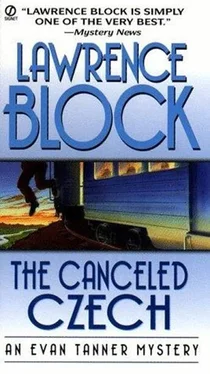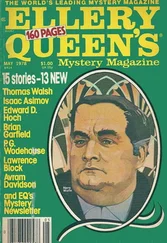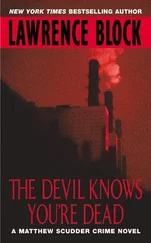“Perhaps I would be better off. Will you take me to Lisbon?”
“Eventually.”
“The Czech swine stole me from my own home. Can you imagine? They searched for my records but could not find them.”
I too had searched for his records, albeit briefly. I had gone to Lisbon en route to Vienna, and while I was there I stole an hour or two to ride out to his home and have a look around. I hadn’t found a thing.
“They will never find them. My records are vital, did you know that? But perhaps that is why you were sent to rescue me. The records and the funds, the Party leaders would want to be sure of those, eh? Perhaps they did not care about me at all.”
“Your service to the Reich is the reason they sent me for you.”
“And not the records? And not the money in the Swiss account? Hah. It does not matter. I cannot walk further. Are we almost at this Jew’s house?”
“Just two doors more.”
Silber came to the door in a nightshirt. I told him that I had a man who needed shelter. He could have the same room the girl had been in, I added, as the girl was on her way out of Czechoslovakia now. My friend Klaus accepted this as he accepted everything else. He showed Kotacek to his room, then came downstairs to see me.
“My friend is very sick,” I said. “He was in one of the camps during the war. It affected his mind.”
“The poor man.”
“He’s completely lost touch with reality. He has decided that he is a Slovak collaborator, a Nazi himself. He prattles idiot slogans about exterminating Jews and others. A perfect transference.”
“Not uncommon. Wish fulfillment, perhaps. One would rather be the conqueror than the conquered. You will take him out of the country, Evan?”
“In a day or two.”
“Stay as long as you like. The poor man, such a way to wind up. And now the war is twenty years in the past, and still he has such scars on his psyche. You will stay here too, Evan?”
“I won’t need a bed. I’ll be out most of the time. But we will have time for some good conversations, Klaus.”
“I hope so, my friend. And do not worry about your poor comrade. I will see that he eats and sleeps well, and I will not let what he says affect me. I will ignore his words, the poor old fellow.”
Klaus would have liked to talk then and there, but I made him go back to bed for a few more hours of sleep. I took some food for myself – eggs, bread, cheese, a couple of cups of coffee. I tried to read some pamphlets he had lying around, but I couldn’t concentrate. I was a little worried about Greta.
I left the house and walked back to the castle. Without Kotacek, it was not a bad walk at all. When I got there, the basement was empty. She had gone, taking her new dress, her other clothes, and the money I had left for her.
I was relieved. If she was up and out, she would be all right. I had great faith in the girl’s ability to survive. No matter where life tossed her, I was confident that she would land on her feet. And roll over onto her back.
We spent fourdays at Klaus Silber’s place. While we were there I followed the Kotacek case in the Prague newspapers. The guards had put together a good story. According to them, several dozen men armed with machine pistols and hand grenades had come over the fences and dropped down upon them, capturing the castle and overcoming all resistance before a shot could be fired in defense. The papers made no mention of the nude condition of the guards. Either they had managed to untie themselves and dress before giving the alarm, or else the press decided to withhold that particular tidbit from its readers. At least one man hadn’t put his uniform on, if only because I had not left it behind for him. I finally wound up stuffing it in a trash can downtown.
Then, the fourth day, the newspapers reported that “reactionary elements of the Stern Gang, composed of Israeli fascist terrorists” had announced the trial and execution of the Slovakian Nazi. The general tone of the article suggested that it was lamentable that Israelis had used gangster methods in so friendly a nation as the People’s Republic of Czechoslovakia, but that, after all, Kotacek was dead either way, and certainly deserved it, and if nothing else Czechoslovakia had been spared the time and expense of a trial.
None of the articles had hinted at any connection between Kotacek and one Evan Michael Tanner. Indeed, I had not been mentioned at all. So by the fourth day I felt we were safe to make our move. They wouldn’t be looking for us now. We would run into heavy trouble if someone happened to recognize us, but there was a lot less chance now that he was officially dead.
And we couldn’t leave fast enough to suit me. The Butcher of Bratislava was a rotten companion and a boorish house guest. He completely ignored my instructions about keeping his mouth shut in front of Klaus, and several times he tossed out Nazi speeches that could have been trouble if our host hadn’t been so well prepared for that sort of thing. “The poor man,” he said each time, “the poor deluded old fellow. Those camps leave one horribly scarred, do they not?”
Another time, he keeled over spontaneously, without benefit of flashlight. I thought it was the catalepsy again, and was frankly grateful for it. But I happened to notice that he was breathing weakly, and that his heart was still beating, and then I remembered other aspects of his medical history. He was a diabetic and had been off the needle ever since his escape. It was miraculous that he hadn’t gone into diabetic coma immediately. He was in it now, and I had to send Klaus rushing off to a druggist for insulin and a hypodermic needle. I guessed at the dosage, and wound up giving him too much, and succeeded only in sending him right off into insulin shock. We stuck a lump of sugar in his mouth to balance it off. It was a little like Alice in Wonderland, eating first from one side and then the other side of the mushroom, but we finally managed to straighten him out. Through it all, I wanted in the worst way to let him die and be done with it.
I stocked up on insulin and got Kotacek to tell me just when he had to have a shot and just how much the dosage should be. Then the fourth day came, and we were ready to roll. I left the house and managed to find the gas station where I had left our car. I was a little nervous about reclaiming the car – if the police had spotted it somehow, they’d be quick to grab anyone who came for it. But it seemed safer to use a pre-stolen car, which the officials had presumably forgotten by now, than to steal a fresh one. I went to the station, and the car was ready.
“Some vandal must have been at it,” the mechanic told me as I paid him. “Someone went to work on that engine as if possessed by devils. I had a difficult time with it, believe me.”
He hadn’t done that well, either, I discovered. The engine ran more smoothly but still sounded pretty bad. I wasn’t sure how long I could drive the little thing without having a breakdown. It would only be safe as far as whatever border we crossed first, as you cannot get a car across a frontier without the proper papers. But we would worry about that when the time came. I’d be satisfied if the car got us safely out of Prague.
I picked up Kotacek, stowed his insulin and needle in one of the bridal couple’s suitcases, took the flashlight and revolver along with me, and loaded Kotacek into the back seat of the car. He didn’t like that. He wanted to ride in front with me. I convinced him that he would stand less chance of being spotted if he sort of slouched in the back. He didn’t like it any better, but he put up with it.
Klaus wouldn’t accept any money. He absolutely refused. “The poor old fellow,” he said. “A convincing transference, yes? One would almost believe he is what he thinks himself to be. Do you think there is any possibility of curing him?”
Читать дальше












